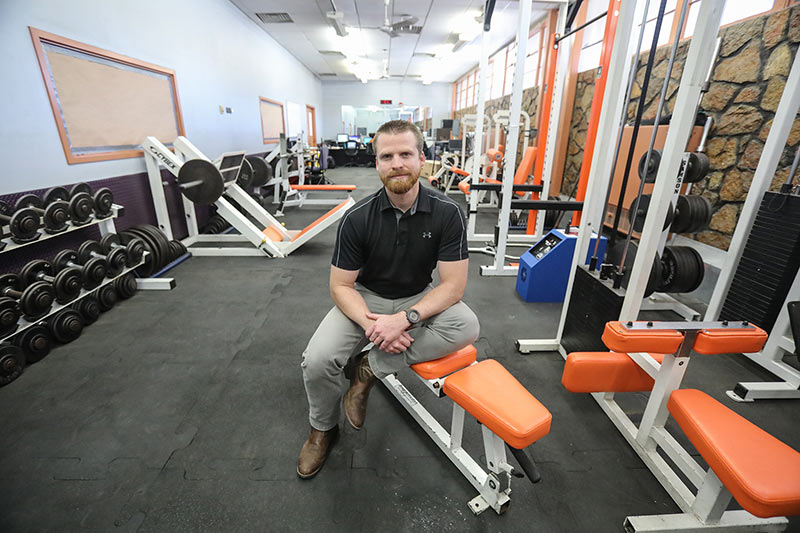Faculty Profile: Cory M. Smith
Last Updated on February 03, 2020 at 12:00 AM
Originally published February 03, 2020
By UC Staff
UTEP Communications
Cory M. Smith, Ph.D., enjoys seeing students comprehend and apply the lessons they have learned as part of his courses in The University of Texas at El Paso's College of Health Sciences. Smith is grateful to work on a campus that encourages students to pursue research and topics they are passionate about.

Name:
Cory M. Smith, Ph.D.
Department/College:
Kinesiology, College of Health Sciences
How long have you been a teacher?
I have been teaching at UTEP since June 2019. Prior to UTEP, I had the privilege of teaching at the University of Nebraska-Lincoln, Victor Valley College Paramedic Program, and as an instructor for Loma Linda Medical Center’s Emergency Room. Topics have included strength and conditioning, exercise physiology, electrocardiogram recognition and treatment, orthopedic procedures, and trauma care.
What’s your favorite classroom activity or teaching technique?
It is extremely fulfilling to pose real-world problems that relate to the lessons being taught in class. This allows students to apply their critical-thinking skills in the classroom while reinforcing the importance and application of material covered within the course.
What background and experience do you have in your field of study that benefits your students?
Prior to completing my bachelor’s degree in California, I served as an emergency medical technician at Loma Linda Medical Center’s Trauma Center, as well as with multiple government disaster and wilderness agencies in the Western United States. During this career, I was exposed to numerous unique situations and training, which provided me real-world examples and stories revolving around physiology. I have found that accompanying my lessons with practical application and stories improves students’ long-term recall of physiological mechanisms within the human body.
What do students like best about your classes?
I do my best to have an open classroom environment that encourages students to ask questions and propose areas of interest to be covered which otherwise may be missed. This allows students to not only learn about the required material, but also about topics they are most passionate about.
What do you love most about being a teacher?
The ability to share my passion each week with the students at UTEP is by far what I love most about teaching. Furthermore, it is exciting to see this passion become contagious and instill a drive in the students to become more involved in research and education.
What are your hobbies? When you’re not teaching, grading or preparing for classes, what are you doing?
I spend the majority of my free time in the outdoors. A few of my hobbies include backpacking, camping, hiking and archery.
When not in the classroom or preparing for classes, I am performing research with my graduate and undergraduate students in the Human and Environmental Physiology Laboratory. Our laboratory specializes in neuromuscular fatigue, extreme environments, military task-performance, neuromuscular rehabilitation, and prosthetic controls. Currently, our lab is working on identifying and improving the cognition, task-performance, and marksmanship of military service members when exposed to extreme environments including high altitudes, heat and cold. In addition, our laboratory is investigating the effects of rapid insertion on muscular strength, muscular endurance, cognition, and task-performance during simulated military tasks. The neuromuscular rehabilitation and prosthetic control team in our laboratory is also busy at work. We are developing a rehabilitation exercise device designed to improve neural plasticity of limbs following traumatic injuries, such as those experienced by military personnel. This device provides immediate biofeedback to the user, which aims to improve their rehabilitation and help the clinician track the recovery process.
What’s your favorite place on campus?
The Centennial Plaza is definitely my favorite place on campus.
What’s your favorite UTEP event, and why?
My favorite event at UTEP is the Centennial Lecture series. Since my arrival at UTEP, numerous interesting topics have been presented, including those from the Central Intelligence Agency and United States Navy. These lectures allow students across campus and me to be exposed to others’ life experiences, current issues, and cutting-edge research we otherwise may be unaware of.
What advice would you give to an incoming UTEP student?
It is great for students to have an open mind to new experiences and careers when coming to college. I believe that college is a time to explore career opportunities and new areas of interest they may otherwise not know exist. Thus, keeping an open mind and having the willingness to participate in lectures, research, and extracurricular activities outside of the classroom provide just as valuable an experience as those obtained the traditional classroom setting. After all, having an open mind and becoming involved in research as an undergraduate is exactly how I ended up becoming a teacher and researcher.